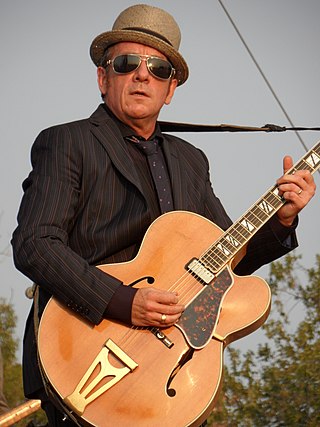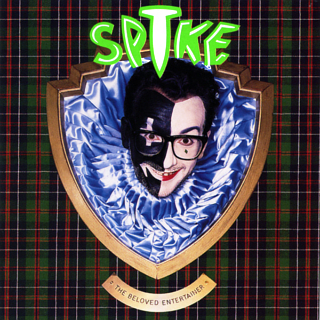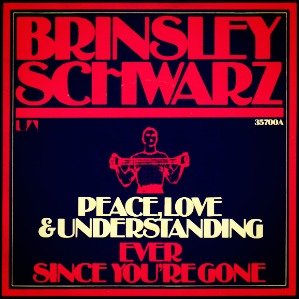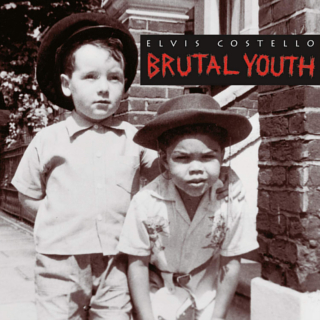Related Research Articles

Declan Patrick MacManus, better known by his stage name Elvis Costello, is an English singer, songwriter, record producer, author and television host. According to Rolling Stone, Costello "reinvigorated the literate, lyrical traditions of Bob Dylan and Van Morrison with the raw energy and sass that were principal ethics of punk", noting the "construction of his songs, which set densely layered wordplay in an ever-expanding repertoire of styles." His first album, My Aim Is True (1977), spawned no hit singles, but contains some of Costello's best-known songs, including the ballad "Alison". Costello's next two albums, This Year's Model (1978) and Armed Forces (1979), recorded with his backing band the Attractions, helped define the new wave genre. From late 1977 until early 1980, each of the eight singles he released reached the UK Top 30. His biggest hit single, "Oliver's Army" (1979), sold more than 500,000 copies in Britain. He has had more modest commercial success in the US, but has earned much critical praise. From 1977 until the early 2000s, Costello's albums regularly ranked high on the Village Voice Pazz & Jop critics' poll, with This Year's Model and Imperial Bedroom (1982) voted the best album of their respective years. His biggest US hit single, "Veronica" (1989), reached number 19 on the Billboard Hot 100.

My Aim Is True is the debut studio album by the English singer-songwriter Elvis Costello, originally released in the United Kingdom on 22 July 1977 through Stiff Records. Produced by Stiff artist and musician Nick Lowe, the album was recorded from late 1976 to early 1977 over six four-hour studio sessions at Pathway Studios in Islington, London. The backing band was the California-based country rock act Clover, who were uncredited on the original release due to contractual difficulties. At the time performing as D.P. Costello, Costello changed his name to Elvis after Elvis Presley at the suggestion of the label, and adjusted his image to match the rising punk rock movement.

Spike is the 12th studio album by English singer-songwriter Elvis Costello, released in 1989 by Warner Bros. Records. It was his first album for the label and first release since My Aim Is True with no appearance by the Attractions. It peaked at No. 5 on the UK Albums Chart and also reached the Billboard 200 at No. 32, thanks to the single and his most notable American hit, "Veronica", which reached No. 19 on the Billboard Hot 100 and No. 1 on the US Modern Rock chart. In The Village Voice's annual Pazz & Jop critics poll for the year's best albums, Spike finished at No. 7.

Blood & Chocolate is the eleventh studio album by the English singer-songwriter Elvis Costello, and his ninth album with the Attractions—keyboardist Steve Nieve, bassist Bruce Thomas and drummer Pete Thomas. It was released on 15 September 1986 through Demon and Columbia Records. After mostly using outside musicians for his previous album King of America, Costello reunited the Attractions and his former producer Nick Lowe for Blood & Chocolate. Recorded in London during a period of heightened tensions between Costello and the Attractions, the tracks were recorded quickly, mostly live in first takes, while the band were set up simultaneously in the same room at Olympic Studios. The Pogues' bassist Cait O'Riordan guested on multiple tracks.

King of America is the tenth studio album by the English singer-songwriter Elvis Costello, released on 21 February 1986. Co-produced by Costello and T Bone Burnett, the album originated following a series of tours the two made under the name "the Coward Brothers". Recording took place in mid-1985 at various studios in Los Angeles, California, with a group of American session musicians dubbed "the Confederates". Selected by Burnett, they included Ray Brown, Earl Palmer and former members of Elvis Presley's TCB Band. Costello's regular backing band, the Attractions, were intended to appear on half of the album before poor sessions led to them appearing on only one track, "Suit of Lights".

"Oliver's Army" is a song written by English musician Elvis Costello and performed by Costello and the Attractions, from the former's third studio album Armed Forces (1979). The song is a new wave track that was lyrically inspired by the Troubles in Northern Ireland and includes lyrics critical of the socio-economic components of war. Costello had travelled to Northern Ireland and was influenced by sights of British soldiers patrolling Belfast. Musically, the song features a glossy production and a keyboard performance inspired by ABBA, creating a juxtaposition between the lyrics and music that both critics and Costello have pointed out.

"(What's So Funny 'Bout) Peace, Love, and Understanding" is a 1974 song written by English singer/songwriter Nick Lowe. Initially released by Lowe with his band Brinsley Schwarz on their 1974 album The New Favourites of... Brinsley Schwarz, the song was released as a single and did not chart.

The Very Best of Elvis Costello is a compilation album by English musician Elvis Costello, first released on 21 September 1999 through Polygram Records. The album spanned his recorded work from 1977 through 1998. It was re-released less than two years later on Rhino Records as the first entry in their comprehensive Costello reissue series.

The Very Best of Elvis Costello and The Attractions 1977–86 is a compilation album by Elvis Costello and the Attractions, released in 1994.

Brutal Youth is an album by English musician Elvis Costello, released in 1994. It contains the first recordings Costello made with his band the Attractions since Blood and Chocolate (1986). Brutal Youth was the third, and most recent of Costello's albums, to peak at number two in the UK Albums Chart, following on from Armed Forces (1979) and Get Happy!! (1980).

Out of Our Idiot is a compilation album by English musician Elvis Costello. It was released only in the United Kingdom on 4 December 1987, through Demon Records. The album consists of B-sides, non-album tracks, and previously unreleased material recorded between 1979 and 1987. Rather than being credited to Elvis Costello, the album is instead credited to "Various Artists" due to Costello's use of pseudonyms on many of the tracks, as well as the numerous collaborations with other artists, including Jimmy Cliff, T Bone Burnett, and Nick Lowe.

The Rose of England is an album by British singer-songwriter Nick Lowe, released in 1985. It is the second overall and last album by Lowe's band the Cowboy Outfit, credited as 'Nick Lowe and His Cowboy Outfit'. It contains three cover versions; "7 Nights to Rock", "I Knew the Bride" and "Bo Bo Skediddle".

"New Amsterdam" is a song written and performed by new wave musician Elvis Costello on his 1980 album, Get Happy!! Written about the New World and New York, the recording of the song that appears on Get Happy!! was a demo that Costello had recorded in Pimlico.

"Clubland" is a song written by new wave musician Elvis Costello and performed by Costello and the Attractions on their 1981 album, Trust. Written in 1980, the song was performed live in festivals before the album's release. The lyrics, inspired by the band's most recent tour, describe life in nightclubs, while the music includes inspiration from The Police.

"Blue Chair" is a song written by new wave musician Elvis Costello and recorded by Costello with his backing band the Attractions. The song first appeared on Costello's 1986 album, Blood & Chocolate. First intended for Costello's previous album King of America, the song was scrapped during that session and reworked with the Attractions around Steve Nieve's piano part.

"Brilliant Mistake" is a song by the English singer-songwriter Elvis Costello that was first released on his 1986 album King of America. Written about Costello's experiences in America, the song features introspective lyrics and a performance from the Confederates, who performed on the track after his usual backing band the Attractions could not perform to Costello's liking.

"I Hope You're Happy Now" is a song written by new wave musician Elvis Costello, recorded by Costello and the Attractions. The track was released on his 1986 album Blood & Chocolate after several failed attempts to record the song for earlier releases.
"Suit of Lights" is a song written and performed by new wave musician Elvis Costello that was first released on his 1986 album King of America. Written about Costello's memories of his father, the song includes introspective lyrics about the "dubious embrace of celebrity" while also featuring the sole performance of the Attractions on the album, who were largely supplanted by the studio professionals of the Confederates on the rest of King of America.
"Next Time Round" is a song written by new wave musician Elvis Costello and recorded by Elvis Costello and the Attractions. The track was released on his 1986 album Blood & Chocolate after an earlier attempt to record the song for his previous album King of America was scrapped.
"Jack of All Parades" is a song by the English singer-songwriter Elvis Costello, which was released on his tenth studio album King of America (1986). The song was written by Costello, credited under his real name Declan MacManus, and produced by T Bone Burnett, Costello and Larry Kalman Hirsch. As a musician, Costello is credited on the track as "The Little Hands of Concrete". It is a love song, inspired by his new relationship with Cait O'Riordan of the Pogues, and is unusual in Costello's catalogue for being a positive love song.
References
Citations
- 1 2 3 King of America (Liner notes). Elvis Costello. 2005.
{{cite AV media notes}}: CS1 maint: others in cite AV media (notes) (link) - 1 2 3 Himes, Geoffrey (23 October 1985). "Nick Lowe, Riding a New Wave". Washington Post. Retrieved 2 February 2023.
- 1 2 Thomson 2006.
- 1 2 Deusner, Stephen M. (8 May 2005). "Elvis Costello: King of America". Pitchfork . Archived from the original on 14 December 2020. Retrieved 3 July 2013.
- 1 2 King of America (Liner notes). Elvis Costello. 1995.
{{cite AV media notes}}: CS1 maint: others in cite AV media (notes) (link) - ↑ Sprague, David (20 July 2005). "Elvis Costello and Emmylou Harris". Variety. Archived from the original on 2 February 2023. Retrieved 2 February 2023.
- ↑ Sinclair, Paul (14 September 2024). "Elvis Costello / King of America & Other Realms". Super Deluxe Edition. Archived from the original on 7 October 2024. Retrieved 2 October 2024.
- ↑ William, Chris (13 September 2024). "Elvis Costello Announces 'King of America & Other Realms' Boxed Set, Spanning Different Eras of His Adventures in Americana". Variety. Archived from the original on 1 October 2024. Retrieved 2 October 2024.
- ↑ Himes, Geoffrey (February 27, 1986). "King of America - The Costello Show (featuring Elvis Costello)". The Washington Post.
- ↑ Flanagan, Bill (1986). "McManus Attack". Musician. Amordian Press. Retrieved 25 January 2023.
- ↑ Willman, Chris (February 16, 1986). "Elvis roots into America". The Los Angeles Times: 63.
- ↑ Kanzler, George (March 2, 1986). "Elvis Costello unveils most intriguing LP". The Star-Ledger: 19.
- ↑ Christensen, Thor (March 11, 1986). "A new phase for Costello". Milwaukee Journal.
- ↑ Sheffield, Rob (19 May 2005). "King Of America: Elvis Costello". Rolling Stone . Archived from the original on 5 November 2007. Retrieved 16 June 2016.
- ↑ "Elvis Costello's 40 best songs". The Telegraph. 26 August 2015. Archived from the original on 24 January 2023. Retrieved 2 February 2023.
- ↑ Bespoke Songs, Lost Dogs, Detours & Rendezvous (Liner notes). Elvis Costello. 1998.
{{cite AV media notes}}: CS1 maint: others in cite AV media (notes) (link) - ↑ Birch, Will (20 August 2019). Cruel to Be Kind: The Life and Music of Nick Lowe. Hachette Books. ISBN 978-0-306-92197-1.
- ↑ Willman, Chris (2 September 2022). "Elvis Costello and Nick Lowe Make for Dream Team at Orange County Tour Stop: Concert Review". Variety. Archived from the original on 2 February 2023. Retrieved 2 February 2023.
- ↑ Horowitz, Hal (1 May 2009). "Nick Lowe - Quiet Please…The New Best of Nick Lowe". American Songwriter. Archived from the original on 2 February 2023. Retrieved 2 February 2023.
- ↑ "Nick Lowe & His Cowboy Outfit, Nick Lowe - The Rose of England Album Reviews, Songs & More | AllMusic". AllMusic . Archived from the original on 2 February 2023. Retrieved 2 February 2023.
Sources
- Thomson, Graeme (2006). Complicated Shadows: The Life and Music of Elvis Costello. Canongate U.S. ISBN 978-1841957968.